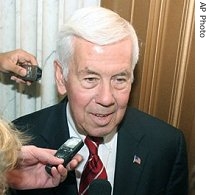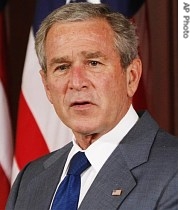2007年VOA标准英语-Republican Defections Fuel US Iraq Debate
搜索关注在线英语听力室公众号:tingroom,领取免费英语资料大礼包。
(单词翻译)
By Al PessinPentagon
28 June 2007
In recent days, two prominent senators from President Bush's Republican Party have made strong statements opposing his new Iraq strategy and calling for a change, well before the first official assessment1 of the strategy is due in September. The strategy involves increasing the number of U.S. troops in Iraq to help train Iraqi forces and provide security so the government can move toward national reconciliation2. The senators' moves have added fuel to the already considerable debate over the future course of U.S. policy toward Iraq, and raise questions about whether the president's new approach is politically viable3 beyond September. VOA Pentagon Correspondent Al Pessin reports.
 |
| Senator Richard Lugar is questioned by reporters regarding Iraq on Capitol Hill, 26 Jun 2007 |
"In my judgment4, the costs and risks of continuing down the current path outweigh5 the potential benefits that might be achieved," he said. "Persisting indefinitely with the surge strategy will delay policy adjustments that have a better chance of protecting our vital interests over the long term."
Senator Lugar called for a reduction in the number of U.S. troops in Iraq, and a new diplomatic strategy for stabilizing6 the region. He said the president's policy has lost touch with vital U.S. national security interests.
On Tuesday, another Republican Senator, George Voinovich, released a letter he sent to President Bush calling on the president to begin planning for the redeployment of U.S. forces and a transition to a situation in which "the Iraqi government and its neighbors play a larger role in stabilizing Iraq."
Previously7, three other Republican senators announced their opposition8 to the surge policy. It is not clear how these Republicans would vote on specific proposals regarding Iraq, but their statements give hope to Democrats9 leading the opposition to the war, that they might be able to get enough votes in the coming months to force a policy change.
The moves by Senators Lugar and Voinovich were hailed by anti-war and anti-surge activists10, including Brian Katulis of the Center for American Progress.
"The historic speech by Senator Lugar in many ways has rendered the September deadline invalid11 and irrelevant," said Katulis. "It's a serious speech, and I think it represents a growing number of voices finally catching12 up with the grim realities in Iraq."
Katulis' group and others are planning to spend the next two months trying to convince members of congress to force the start of the withdrawal13 of most U.S. troops from Iraq by September.
That is when the new U.S. Iraq commander General David Petraeus and the new U.S. Ambassador to Iraq Ryan Crocker are to deliver a formal report on the results of the troop surge and the strategy change President Bush announced in January.
But some senior military officers and civilian14 officials have already said General Petraeus and Ambassador Crocker will likely say they need more time to make the strategy work. The number two U.S. commander in Iraq, Lieutenant15 General Ray Odierno, said last week it could take until next spring to create the conditions for a U.S. troop reduction that would not leave chaos16 in its wake.
 |
| President Bush, 26 June 2007 |
"It's a well-conceived plan by smart military people," he said. "And we owe them the time, and we owe them the support they need to succeed."
The president said his policy should not be judged based on al-Qaida's ability to get bomb attacks on television, because the consequences of withdrawing U.S. troops from Iraq too soon would be terrible.
"If we withdraw before the Iraqi government can defend itself, we would yield the future of Iraq to terrorists like al-Qaida, and we would give a green light to extremists all throughout a troubled region," the president said. "The consequences for America in the Middle East would be disastrous17."
Conservative analyst18 Thomas Donnelly of the American Enterprise Institute agrees, and says the senators who oppose the new strategy do not understand its purpose.
"What would strike me as particularly tragic19 would be to have militarily seized the initiative and inflicted20 great damage on not only al-Qaida but the Shia extremists in Iraq, and then for the United States to withdraw or draw down," he said. "I would just hope that success on the battlefield would not only create a different political environment in Iraq, but would create a different political environment in the United States."
But Senator Lugar indicated that is not likely. In his speech Monday, he said the administration needs to recognize that public opinion, opposition in the Congress and next year's presidential election campaign will make the president's policy increasingly difficult to pursue in the coming months.
"The prospects21 that the current surge strategy will succeed in the way originally envisioned by the president are very limited in the short period of time framed by our own domestic political debate," Senator Lugar said.
An appeal for more time would also not impress retired22 U.S. Army Brigadier General John Johns, a Vietnam combat commander and former dean at the National Defense23 University, who opposes the war and believes U.S. troops cannot effectively combat an insurgency24.
"The situation in Iraq today is chaos, and there is absolutely zero chance of this surge working," he said. "Petraeus and his brain trust are the best we have. But this is just 'Mission Impossible.'"
Just how much time President Bush will have to implement25 his new Iraq strategy could be determined26 in part by congressional votes on the defense budget for the fiscal27 year that starts October 1. The man who is perhaps the most influential28 Republican senator on defense issues, John Warner, is to visit Iraq next week. Analysts29 say his views after that trip could be politically decisive.




